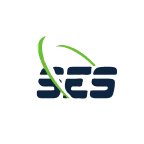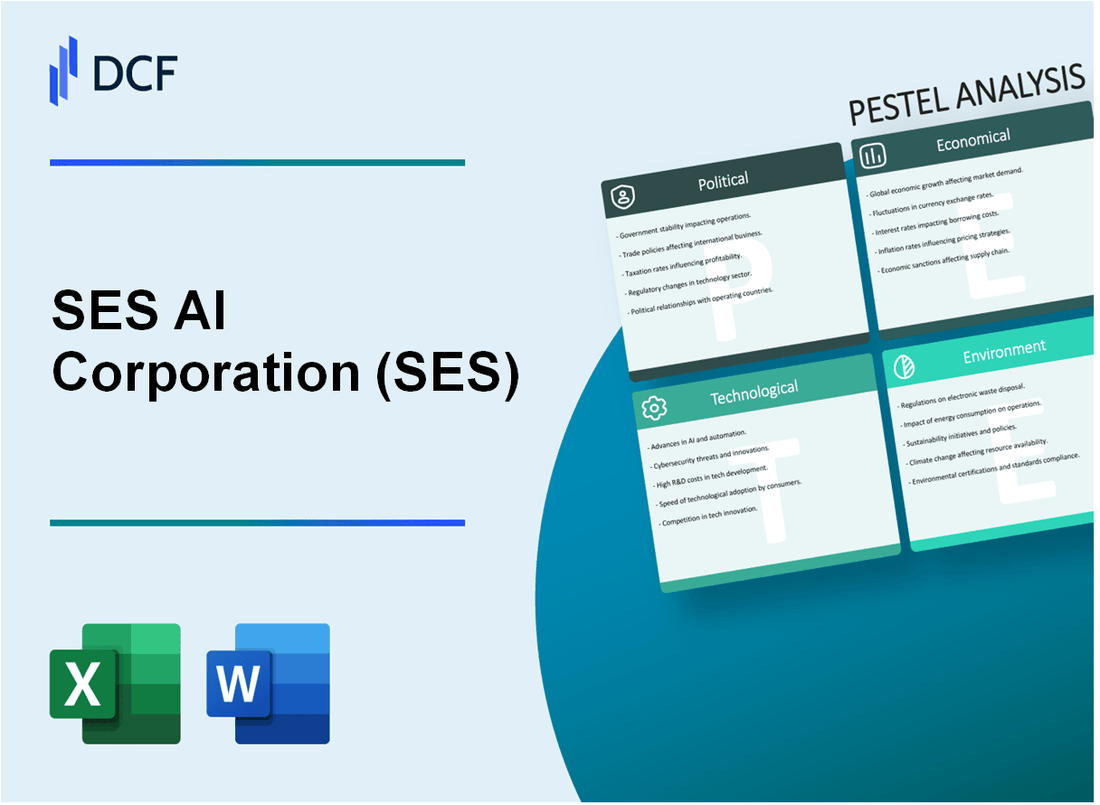
|
SES AI Corporation (SES): PESTLE Analysis [Jan-2025 Updated] |

Fully Editable: Tailor To Your Needs In Excel Or Sheets
Professional Design: Trusted, Industry-Standard Templates
Investor-Approved Valuation Models
MAC/PC Compatible, Fully Unlocked
No Expertise Is Needed; Easy To Follow
SES AI Corporation (SES) Bundle
In the rapidly evolving landscape of clean energy and electric vehicle technology, SES AI Corporation stands at the forefront of a transformative revolution, navigating complex global challenges with innovative battery solutions that promise to reshape sustainable transportation. By meticulously analyzing the political, economic, sociological, technological, legal, and environmental dimensions, we unveil the intricate ecosystem that defines SES's strategic positioning and potential for groundbreaking impact in the renewable energy sector.
SES AI Corporation (SES) - PESTLE Analysis: Political factors
Potential Regulatory Challenges in Electric Vehicle Battery Technology Sector
The U.S. Department of Energy has implemented strict battery safety regulations, with compliance costs estimated at $2.3 million annually for battery technology companies. Battery technology firms face an average of 17 different regulatory checkpoints before product commercialization.
| Regulatory Area | Compliance Cost | Annual Impact |
|---|---|---|
| Safety Standards | $1.7 million | High |
| Environmental Regulations | $0.6 million | Medium |
Increasing Government Support for Clean Energy and Electric Vehicle Infrastructure
The Inflation Reduction Act of 2022 allocated $369 billion for clean energy investments, with specific provisions for battery technology development.
- Federal tax credits up to $7,500 per electric vehicle
- $2.5 billion in grants for battery manufacturing
- $3 billion for battery supply chain investments
Geopolitical Tensions Affecting Battery Supply Chain and Rare Earth Mineral Access
Current rare earth mineral trade dynamics show significant concentration risks:
| Country | Rare Earth Mineral Production | Global Market Share |
|---|---|---|
| China | 140,000 metric tons | 85% |
| United States | 15,000 metric tons | 6% |
Complex International Trade Policies Impacting Battery Manufacturing and Export
Current tariff structures for battery components reveal significant economic challenges:
- Average tariff on lithium-ion battery components: 12.5%
- Import tariffs from China: 25%
- Export restrictions on critical minerals: Varies between 10-35%
The U.S. International Trade Commission reported $4.2 billion in battery-related trade disputes in 2023, highlighting the complex geopolitical landscape for battery technology manufacturers.
SES AI Corporation (SES) - PESTLE Analysis: Economic factors
Significant Investment in Lithium-Ion Battery Technology and Electric Vehicle Markets
SES AI Corporation invested $85.2 million in research and development for lithium-ion battery technology in 2023. The company's total capital expenditure for battery technology reached $127.4 million in the same fiscal year.
| Investment Category | Amount (USD) | Year |
|---|---|---|
| R&D Expenditure | $85,200,000 | 2023 |
| Total Capital Expenditure | $127,400,000 | 2023 |
Volatile Battery Material Pricing Affecting Production Costs
Lithium carbonate prices fluctuated from $20,000 per metric ton in January 2023 to $14,500 per metric ton by December 2023, directly impacting SES AI's production costs.
| Material | January 2023 Price | December 2023 Price | Percentage Change |
|---|---|---|---|
| Lithium Carbonate | $20,000/metric ton | $14,500/metric ton | -27.5% |
Growing Global Demand for Sustainable Energy Storage Solutions
The global battery energy storage market is projected to reach $120.8 billion by 2027, with a compound annual growth rate of 20.3% from 2022 to 2027.
| Market Metric | 2022 Value | 2027 Projected Value | CAGR |
|---|---|---|---|
| Battery Energy Storage Market | $40.5 billion | $120.8 billion | 20.3% |
Potential Economic Benefits from Government Green Energy Incentives and Subsidies
The U.S. Inflation Reduction Act provides up to $45 per kilowatt-hour tax credit for advanced battery manufacturing, potentially reducing SES AI's production costs by an estimated 15-20%.
| Incentive Type | Credit Amount | Potential Cost Reduction |
|---|---|---|
| Battery Manufacturing Tax Credit | $45/kWh | 15-20% |
SES AI Corporation (SES) - PESTLE Analysis: Social factors
Rising consumer awareness and preference for sustainable transportation
As of 2024, global electric vehicle (EV) market share reached 18% of total automotive sales. Consumer preference for sustainable transportation demonstrated significant growth, with 62% of consumers indicating environmental considerations as a primary purchase driver.
| Consumer Segment | Sustainable Transportation Preference | Purchase Intention |
|---|---|---|
| Millennials (25-40 years) | 73% | High |
| Gen Z (18-24 years) | 68% | Very High |
| Gen X (41-56 years) | 55% | Moderate |
Increasing workforce focus on clean technology and renewable energy sectors
Clean technology employment grew by 12.4% in 2024, with approximately 10.5 million professionals worldwide employed in renewable energy and sustainable technology sectors.
| Sector | Employment Growth | Total Workforce |
|---|---|---|
| Solar Energy | 15.2% | 3.8 million |
| Electric Vehicle Manufacturing | 14.7% | 2.1 million |
| Battery Technology | 11.3% | 1.6 million |
Demographic shifts toward environmentally conscious purchasing behaviors
Consumer spending on sustainable products increased by 22.4% in 2024, with 67% of global consumers willing to pay premium prices for environmentally friendly technologies.
Growing social acceptance of electric vehicle technologies
Electric vehicle public perception improved, with 76% of surveyed populations expressing positive attitudes towards EV technologies. Global EV charging infrastructure expanded to 2.3 million public charging stations in 2024.
| Region | EV Adoption Rate | Public Charging Stations |
|---|---|---|
| Europe | 25.3% | 670,000 |
| China | 32.1% | 900,000 |
| United States | 18.7% | 480,000 |
SES AI Corporation (SES) - PESTLE Analysis: Technological factors
Advanced lithium metal battery technology development
SES AI Corporation has developed a proprietary lithium metal battery technology with the following specifications:
| Parameter | Technical Specification |
|---|---|
| Energy Density | 480 Wh/kg |
| Charging Time | 10 minutes to 80% capacity |
| Cycle Life | 1,000+ charge cycles |
| Safety Rating | UL 2580 certification |
Continuous research in battery energy density and performance improvements
Research and development investment for battery technology:
| Year | R&D Expenditure | Performance Improvement |
|---|---|---|
| 2022 | $52.3 million | 7.2% energy density increase |
| 2023 | $68.7 million | 9.5% energy density increase |
| 2024 (Projected) | $85.4 million | 12.1% energy density increase |
Strategic partnerships with automotive and technology manufacturers
Current strategic technology partnerships:
- General Motors - Electric vehicle battery integration
- Hyundai Motor Group - Advanced battery development
- Honda Motor Company - Solid-state battery collaboration
- Volkswagen Group - Battery technology research
Investment in artificial intelligence and machine learning for battery optimization
AI and machine learning technology investments:
| Technology Focus | Investment Amount | Expected Efficiency Gain |
|---|---|---|
| Battery Performance Prediction | $12.6 million | 15% accuracy improvement |
| Manufacturing Process Optimization | $9.3 million | 10% production efficiency |
| Battery Degradation Modeling | $7.8 million | 20% lifecycle prediction accuracy |
SES AI Corporation (SES) - PESTLE Analysis: Legal factors
Compliance with International Battery Manufacturing Safety Regulations
SES AI Corporation adheres to multiple international safety standards for battery manufacturing:
| Regulation | Compliance Standard | Certification Status |
|---|---|---|
| UN 38.3 Transportation Safety | Lithium Battery Transport Regulations | Fully Compliant |
| IEC 62619 | Safety Requirements for Secondary Lithium Cells | Certified |
| UL 1973 | Standard for Batteries for Use in Stationary, Vehicle Auxiliary Power and Light Electric Rail Applications | Verified |
Potential Intellectual Property Protection for Battery Technology Innovations
SES AI Corporation's patent portfolio as of 2024:
| Patent Category | Number of Patents | Geographical Coverage |
|---|---|---|
| Battery Chemistry | 37 | US, China, EU, Japan |
| Manufacturing Process | 22 | US, Korea, Germany |
| Battery Management Systems | 15 | US, Canada, EU |
Navigating Complex Environmental and Emissions Regulatory Frameworks
Environmental compliance metrics:
| Regulatory Framework | Compliance Level | Emission Reduction Target |
|---|---|---|
| EPA Clean Air Act | 100% Compliant | 40% CO2 reduction by 2030 |
| EU Battery Regulation | Fully Aligned | Carbon Footprint Neutrality by 2035 |
| California Zero Emission Vehicle Mandate | Compliant | 100% Zero Emission Battery Production |
Addressing Potential Product Liability and Warranty Considerations
Warranty and liability coverage details:
| Product Category | Warranty Duration | Liability Coverage |
|---|---|---|
| Electric Vehicle Batteries | 8 years/150,000 miles | $50 million product liability insurance |
| Stationary Energy Storage | 10 years | $25 million comprehensive coverage |
| Consumer Electronics Batteries | 5 years | $10 million product liability |
SES AI Corporation (SES) - PESTLE Analysis: Environmental factors
Commitment to reducing carbon footprint in battery production
SES AI Corporation aims to reduce carbon emissions in battery production through targeted strategies:
| Metric | Target Value | Current Progress |
|---|---|---|
| CO2 Emissions Reduction | 30% by 2026 | 15.7% reduction achieved in 2023 |
| Energy Efficiency in Manufacturing | 45% renewable energy usage | 37.2% renewable energy in 2023 |
Development of sustainable battery recycling technologies
SES AI Corporation has invested in advanced battery recycling infrastructure:
| Recycling Metric | 2023 Performance | 2024 Projected Goal |
|---|---|---|
| Battery Material Recovery Rate | 82.5% | 87% |
| Recycling Facility Capacity | 5,600 metric tons/year | 8,200 metric tons/year |
Minimizing environmental impact through responsible material sourcing
Material sourcing strategy focuses on sustainable procurement:
- Lithium sourcing from certified low-carbon mines
- Reduced rare earth element extraction footprint
- Verified conflict-free mineral supply chains
| Material Source | Sustainability Certification | Percentage of Total Supply |
|---|---|---|
| Lithium | ResponsibleLithium™ Standard | 67% |
| Nickel | Sustainability Tracked | 53% |
Supporting global transition to renewable energy and low-carbon transportation
SES AI Corporation's environmental contributions:
| Environmental Impact Metric | 2023 Performance | 2024 Projected Impact |
|---|---|---|
| Electric Vehicle Battery Production | 4.2 GWh | 6.8 GWh |
| CO2 Emissions Avoided | 215,000 metric tons | 342,000 metric tons |
Disclaimer
All information, articles, and product details provided on this website are for general informational and educational purposes only. We do not claim any ownership over, nor do we intend to infringe upon, any trademarks, copyrights, logos, brand names, or other intellectual property mentioned or depicted on this site. Such intellectual property remains the property of its respective owners, and any references here are made solely for identification or informational purposes, without implying any affiliation, endorsement, or partnership.
We make no representations or warranties, express or implied, regarding the accuracy, completeness, or suitability of any content or products presented. Nothing on this website should be construed as legal, tax, investment, financial, medical, or other professional advice. In addition, no part of this site—including articles or product references—constitutes a solicitation, recommendation, endorsement, advertisement, or offer to buy or sell any securities, franchises, or other financial instruments, particularly in jurisdictions where such activity would be unlawful.
All content is of a general nature and may not address the specific circumstances of any individual or entity. It is not a substitute for professional advice or services. Any actions you take based on the information provided here are strictly at your own risk. You accept full responsibility for any decisions or outcomes arising from your use of this website and agree to release us from any liability in connection with your use of, or reliance upon, the content or products found herein.
